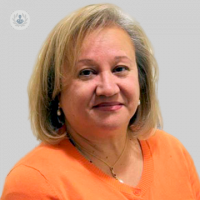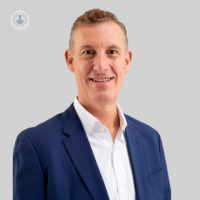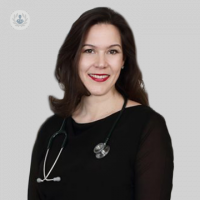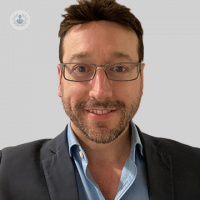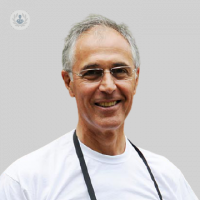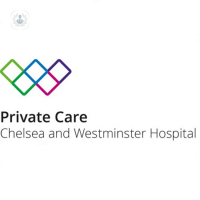What is paediatrics?
Paediatricians and specialists in paediatric fields are doctors who manage medical conditions affecting young children, infants, and adolescents. Generally, paediatricians have a role in your child’s healthcare up to the age of 18.

What conditions does a paediatrician treat?
A child’s body and an adult’s body are of course different, as children are not simply ‘smaller adults’. Different conditions can affect children, which mean they require a doctor specialising in those particular medical conditions and the anatomy of the child. Paediatricians first qualify as doctors in the UK then go on to specialise in paediatrics.
Paediatricians are able to treat and manage a number of conditions, ranging from minor health problems like a cough or rash, to more serious or long-term conditions, including congenital defects, hormonal problems, developmental issues, and mental or behavioural problems.
As there are a number of conditions which affect children and which require specialist assessment, paediatricians work closely with doctors in other specialties, and can choose to further specialise in specific sub-specialties of paediatrics.
Which sub-specialties are included under paediatrics?
Paediatric sub-specialties in the UK include:
- Child mental health (assessing and managing mental health difficulties)
- Community child health (caring for vulnerable children eg those with developmental problems, or those who are at risk of facing abuse)
- Neonatal medicine (caring for newborns or premature babies)
- Paediatric allergy, immunology and infectious diseases (infectious and allergic disorders, or problems with the immune system)
- Paediatric clinical pharmacology (the development of medicine for children and the use of medicine)
- Paediatric diabetes and endocrinology (hormonal conditions and disorders)
- Paediatric emergency medicine (acute healthcare)
- Paediatric gastroenterology, hepatology, and nutrition (conditions affecting the gastrointestinal tract and liver)
- Paediatric inherited metabolic medicine (inherited disorders affecting the body’s reactions)
- Paediatric intensive care medicine (treating critically ill children)
- Paediatric nephrology (disorders affecting the kidney)
- Paediatric neuro-disability (acquired long-term conditions, or congenital disabilities)
- Paediatric neurology (conditions affecting the nervous system)
- Paediatric oncology (cancer)
- Paediatric palliative care (life-threatening conditions or life-limiting conditions)
- Paediatric respiratory medicine (conditions affecting the respiratory system)
- Paediatric rheumatology (inflammatory disorders)
Other paediatric areas, such as paediatric cardiology and paediatric surgery, are specialties within their own right.
When should my child see a paediatrician?
Your child will see a paediatrician throughout their young life until around the age of 18. If necessary, your paediatrician or GP will refer your child on to a specialist area for their treatment or assessment if it is considered that they need further assessment or more specialised management.
01-09-2019 07-17-2020Paediatrics
Dr Bushra Al-Rubeyi - Paediatrics
Created on: 01-09-2019
Updated on: 07-17-2020
Edited by: Karolyn Judge
What is paediatrics?
Paediatricians and specialists in paediatric fields are doctors who manage medical conditions affecting young children, infants, and adolescents. Generally, paediatricians have a role in your child’s healthcare up to the age of 18.

What conditions does a paediatrician treat?
A child’s body and an adult’s body are of course different, as children are not simply ‘smaller adults’. Different conditions can affect children, which mean they require a doctor specialising in those particular medical conditions and the anatomy of the child. Paediatricians first qualify as doctors in the UK then go on to specialise in paediatrics.
Paediatricians are able to treat and manage a number of conditions, ranging from minor health problems like a cough or rash, to more serious or long-term conditions, including congenital defects, hormonal problems, developmental issues, and mental or behavioural problems.
As there are a number of conditions which affect children and which require specialist assessment, paediatricians work closely with doctors in other specialties, and can choose to further specialise in specific sub-specialties of paediatrics.
Which sub-specialties are included under paediatrics?
Paediatric sub-specialties in the UK include:
- Child mental health (assessing and managing mental health difficulties)
- Community child health (caring for vulnerable children eg those with developmental problems, or those who are at risk of facing abuse)
- Neonatal medicine (caring for newborns or premature babies)
- Paediatric allergy, immunology and infectious diseases (infectious and allergic disorders, or problems with the immune system)
- Paediatric clinical pharmacology (the development of medicine for children and the use of medicine)
- Paediatric diabetes and endocrinology (hormonal conditions and disorders)
- Paediatric emergency medicine (acute healthcare)
- Paediatric gastroenterology, hepatology, and nutrition (conditions affecting the gastrointestinal tract and liver)
- Paediatric inherited metabolic medicine (inherited disorders affecting the body’s reactions)
- Paediatric intensive care medicine (treating critically ill children)
- Paediatric nephrology (disorders affecting the kidney)
- Paediatric neuro-disability (acquired long-term conditions, or congenital disabilities)
- Paediatric neurology (conditions affecting the nervous system)
- Paediatric oncology (cancer)
- Paediatric palliative care (life-threatening conditions or life-limiting conditions)
- Paediatric respiratory medicine (conditions affecting the respiratory system)
- Paediatric rheumatology (inflammatory disorders)
Other paediatric areas, such as paediatric cardiology and paediatric surgery, are specialties within their own right.
When should my child see a paediatrician?
Your child will see a paediatrician throughout their young life until around the age of 18. If necessary, your paediatrician or GP will refer your child on to a specialist area for their treatment or assessment if it is considered that they need further assessment or more specialised management.
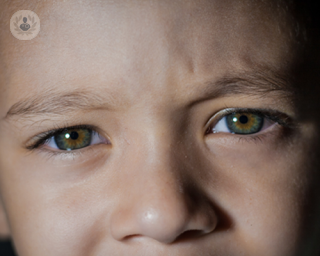

Should I worry if my child has one pupil bigger than the other?
By Dr Annegret Dahlmann-Noor
2024-12-30
The pupils help us to adapt to our environment in an instant, adjusting to light as required. One possibility that can occur is that they can be different sizes - if you notice this in your child, is it something to be concerned about? Director of Moorfields Eye Hospital's children's eye service, Dr Annegret Dahlmann-Noor takes an expert look at this topic. See more
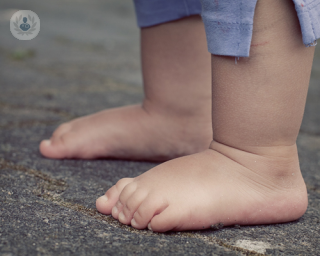

Falling flat? Misconceptions about flat feet
By Mr Thomas Crompton
2024-12-30
Some people's perception of having flat feet may not involve being a sporting legend, but did you know both Cristiano Ronaldo and Usain Bolt have them? Consultant orthopaedic surgeon and paediatric specialist, Mr Thomas Crompton, provides reassurance for parents who may be concerned about problems leading from flat feet and discusses how, on the whole, children having them is completely normal - and how they could be the feet of future champions. See more


An expert look at treatment options for children’s chronic constipation
By Mr Brian MacCormack
2024-12-30
Highly respected consultant paediatric surgeon Mr Brian MacCormack offers expert insight on the various treatment options for chronic constipation in children and details when surgical intervention is necessary. See more


My child has conjunctivitis, how contagious is it?
By Professor Saurabh Jain
2024-12-30
Conjunctivitis, commonly known as pink eye is inflammation of the conjunctiva. This is the clear thin tissue that covers the white part of the eye. It’s quite common in young kids. Leading consultant ophthalmic surgeon Mr Saurabh Jain is here to talk about conjunctivitis, in particular, infectious conjunctivitis and when to take your child to a paediatric ophthalmologist. See more
Experts in Paediatrics
-
Dr Bushra Al-Rubeyi
PaediatricsExpert in:
- Child development
- Paediatrics
- Asthma
- Constipation
- Chronic fatigue
- Child allergies
-
Dr Martin Gray
PaediatricsExpert in:
- Paediatrics
- Colic
- Children’s primary care
- Respiratory diseases
- Wheezing
- Infant feeding
-
Dr Victoria Owen
GP (general practitioner)Expert in:
- Health check up (health screening)
- Hormone replacement therapy (HRT)
- Coronavirus
- Psychiatric Expertise
- Paediatrics
- Vaccinations
-
Mr Alex Turner
Paediatric urologyExpert in:
- Urinary tract infection
- Bladder problems
- Paediatric urology
- Paediatrics
- Undescended testicle (Cryptorchidism)
- Vesicoureteral reflux (VUR) (kidney reflux)
-
Professor Parviz Habibi
Paediatric respiratory medicineExpert in:
- Breathing problems
- Paediatrics
- Sleep disorders
- Respiratory infection
- Chest infection
- Obstructive sleep apnea
- See all

Bright Futures Health
Bright Futures Health
77 Wimpole Street, Marylebone, London, W1G 9RU
No existe teléfono en el centro.
By using the telephone number provided by TOP DOCTORS, you automatically agree to let us use your phone number for statistical and commercial purposes. For further information, read our Privacy Policy
Top Doctors

Cleveland Clinic London Hospital
Cleveland Clinic London Hospital
33 Grosvenor Place
No existe teléfono en el centro.
By using the telephone number provided by TOP DOCTORS, you automatically agree to let us use your phone number for statistical and commercial purposes. For further information, read our Privacy Policy
Top Doctors

Private Care at Chelsea and Westminster Hospital
Private Care at Chelsea and Westminster Hospital
Chelsea and Westminster Hospital, 369 Fulham Rd.
No existe teléfono en el centro.
By using the telephone number provided by TOP DOCTORS, you automatically agree to let us use your phone number for statistical and commercial purposes. For further information, read our Privacy Policy
Top Doctors
-
Bright Futures Health
77 Wimpole Street, Marylebone, London, W1G 9RU, W1G Marylebone LondonExpert in:
- Children's primary care
- Child development
- Paediatrics
- Preventive paediatrics
- Health check up
- Child health surveillance
-
Cleveland Clinic London Hospital
33 Grosvenor Place, Central LondonExpert in:
- Cardiology
- Colorectal surgery
- Minimal access surgery (keyhole surgery)
- Gallbladder surgery
- Diagnostic Imaging
- Ultrasound
-
Private Care at Chelsea and Westminster Hospital
Chelsea and Westminster Hospital, 369 Fulham Rd., Central LondonExpert in:
- General Surgery
- Dermatology
- Paediatric Dermatology
- Paediatrics
- Preventive paediatrics
- Adult and paediatric services
- See all
- Most viewed diseases, medical tests, and treatments
- Snoring
- Immunotherapy
- Alzheimer's disease
- Cluster headaches
- Tension headache
- Chronic headache
- Nystagmus
- Myopia
- Hyperopia (farsightedness)
- Eye examination
